CHRISTIAN CHÁVEZ OPENS UP ABOUT MENTAL HEALTH
NEW RESOURCES FOR COMBATING ADDICTION


CHRISTIAN CHÁVEZ OPENS UP ABOUT MENTAL HEALTH
NEW RESOURCES FOR COMBATING ADDICTION

ARMONTÉ BUTLER WANTS
EVERYONE TO GET THE CARE THEY DESERVE
This is only a brief summary of important information about BIKTARVY® and does not replace talking to your healthcare provider about your condition and your treatment.
BIKTARVY may cause serious side effects, including:
Worsening of hepatitis B (HBV) infection. our healthcare provider will test you for H . f you have both H - and H , your H may suddenly get worse if you stop taking . Do not stop taking without first talking to your healthcare provider, as they will need to check your health regularly for several months, and may give you H medicine.
is a complete, -pill, once-a-day prescription medicine used to treat H - in adults and children who weigh at least 55 pounds. t can either be used in people who have never taken H - medicines before, or people who are replacing their current H - medicines and whose healthcare provider determines they meet certain requirements.
BIKTARVY does not cure HIV-1 or AIDS. H - is the virus that causes D .
Do NOT take BIKTARVY if you also take a medicine that contains:
dofetilide
rifampin
any other medicines to treat H -
Tell your healthcare provider if you:
Have or have had any kidney or liver problems, including hepatitis infection.
Have any other health problems.
re pregnant or plan to become pregnant. ell your healthcare provider if you become pregnant while taking .
re breastfeeding (nursing) or plan to breastfeed. alk to your healthcare provider about the risks of breastfeeding during treatment with . Tell your healthcare provider about all the medicines you take:
eep a list that includes all prescription and over-thecounter medicines, antacids, laxatives, vitamins, and herbal supplements, and show it to your healthcare provider and pharmacist.
and other medicines may affect each other. sk your healthcare provider and pharmacist about medicines that interact with , and ask if it is safe to take with all your other medicines.
BIKTARVY may cause serious side eff ects, including:
hose in the “Most mportant nformation bout ” section.
Changes in your immune system. our immune system may get stronger and begin to fight infections that may have been hidden in your body. ell your healthcare provider if you have any new symptoms after you start taking .
Kidney problems, including kidney failure. our healthcare provider should do blood and urine tests to check your kidneys. f you develop new or worse kidney problems, they may tell you to stop taking .
Too much lactic acid in your blood (lactic acidosis), which is a serious but rare medical emergency that can lead to death. ell your healthcare provider right away if you get these symptoms: weakness or being more tired than usual, unusual muscle pain, being short of breath or fast breathing, stomach pain with nausea and vomiting, cold or blue hands and feet, feel dizzy or lightheaded, or a fast or abnormal heartbeat.
Severe liver problems , which in rare cases can lead to death. ell your healthcare provider right away if you get these symptoms: skin or the white part of your eyes turns yellow, dark “tea-colored” urine, light-colored stools, loss of appetite for several days or longer, nausea, or stomach-area pain.
The most common side effects of BIKTARVY in clinical studies were diarrhea (6%), nausea (6%), and headache (5%).
hese are not all the possible side effects of . ell your healthcare provider right away if you have any new symptoms while taking . ou are encouraged to report negative side eff ects of prescription drugs to the FD . isit www.FD .gov/medwatch or call - -FD - .
Your healthcare provider will need to do tests to monitor your health before and during treatment with BIKTARVY.
ake time each day with or without food.
his is only a brief summary of important information about . alk to your healthcare provider or pharmacist to learn more.
Go to .com or call - -G L D-5.
f you need help paying for your medicine, visit .com for program information.











































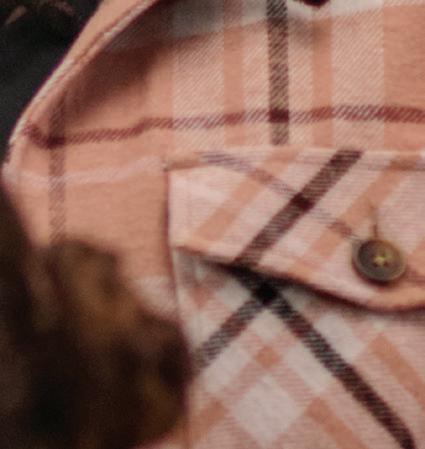







SAVING SEX ED Health Hero of the Year Armonté Butler fights to empower marginalized communities with health education.

Features
10 A RIDE TO REMEMBER Look back at over 30 years of AIDS/ LifeCycle.
16 HEALTH HEROES See 2024’s top champions in health care, wellness, and beyond.
6 VIRAL RESPONSE The U.S. amps up its efforts to combat a new mpox strain.
8 DON’T STRESS Minority stress contributes to greater substance use. Here’s how to get help.
20 THE NEW PREP? A biannual injectable may be a gamechanger in HIV prevention.
22 THE GREAT OUTDOORS Queer Hikes brings LGBTQ+ people out in nature.
23 SPICE UP YOUR LIFE A little hot sauce is the secret ingredient in this shrimp and quinoa recipe.
24 GOOD CHRISTIAN Out actor and musician Christian Chávez tackles stigma on mental health.

editor in chief DESIRÉE GUERRERO
executive creative director RAINE BASCOS
EDITORIAL
senior editor JOHN CASEY senior copy editor TRUDY RING
ART graphic designer MARIUSZ WALUS digital photo editor NIKKI AYE
EQUALPRIDE EDITORIAL
vp editorial & special projects TRACY E. GILCHRIST
editor in chief, out DANIEL REYNOLDS editor in chief, out.com RAFFY ERMAC deputy editor, out.com BERNARDO SIM editor in chief, the advocate DESIRÉE GUERRERO editor in chief, advocate.com ALEX COOPER managing editor, out traveler DONALD PADGETT editor in chief, pride.com RACHEL SHATTO
senior editor JOHN CASEY
sr. national reporter CHRISTOPHER WIGGINS
staff writers RYAN ADAMCZESKI, RICKY CORNISH, MEY RUDE
community editor MARIE-ADÉLINA DE LA FERRIÈRE contributing writer ALEX GARNER
ADVOCATE CHANNEL
senior executive producer of programming
MARY SCHWAGER
vp, executive producer women’s programming & host
SONIA BAGHDADY
supervising producer, operations manager
MICHAEL SMITH
senior producer BRIAN KELLEY senior producer CARA GLASS host, producer JAYMES VAUGHAN host, producer STEPHEN WALKER video editors LAMONT BALDWIN, WALTER COLVIN, LACY VALENTI
post production editor IRIS WALL
chief executive officer MARK BERRYHILL cofounder, equalpride MICHAEL KELLEY chief financial officer JOE LOVEJOY head of revenue AMANDA BINNS
chief operating officer BERNARD ROOK
senior vice president, editorial KAYLA GAGNET
executive vice president, corporate sales & partnerships STUART BROCKINGTON
chief of staff CHRISTOPHER GO vp & publisher of out, the advocate, & plus MARK ISOM vp, corporate sales JOE VALENTINO
ADVERTISING, BRAND PARTNERSHIPS & INTEGRATED SALES
vp, brand partnerships TIM SNOW vp, brand partnerships JOSH BAREÑO senior creative director, brand partnerships MICHAEL LOMBARDO director, corporate sales KAYLYN BLACKMORE managers, brand partnerships ALEX HOFFMAN, ERIN MANLEY, KEIGHTON LEE, JOSE CARDENAS videographer and editor, brand partnerships STUART SOX coordinator, sales & advertising administration LULU DROPO coordinator, brand partnerships JULEAN DEJESUS account manager, corporate sales MARCUS HOEY
ADVERTISING
vp, ad operations STEWART NACHT manager, ad operations TIFFANY KESDEN
MARKETING
manager, social media CHRISTINE LINNELL specialist, social media JADE DELGADO senior marketing designer ERIK BROCK
CIRCULATION
director of circulation ARGUS GALINDO
FINANCE/ACCOUNTING
controller, HR director PAULETTE KADIMYAN accounts receivable LORELIE YU
OPERATIONS
vp, technology and development ERIC BUI

ADVERTISING & SUBSCRIPTIONS
phone 212.242.8100
advertising fax 212.242.8338 subscriptions equalpride.com/plus-subcontact
EDITORIAL editor.plus@equalpride.com

FREE BULK SUBSCRIPTIONS FOR YOUR OFFICE OR GROUP
Any organization, community-based group, pharmacy, physicians’ office, support group, or other agency can request bulk copies for free distribution at your office, meeting, or facility. To subscribe, visit equalpride.com/plus-print-signup. There is a 10-copy minimum.
FREE DIGITAL SUBSCRIPTIONS
Health PLUS Wellness magazine is available free to individual subscribers — a digital copy of each issue can be delivered to the privacy of your computer or reader six times per year. We require only your email address to initiate delivery. You may also share your digital copies with friends.
To subscribe, visit equalpride.com/plus-digi-signup.
NEED SUBSCRIPTION HELP?
If you have any questions or problems with your bulk or individual magazine delivery, please email our circulation department at argus.galindo@equalpride.com
Health PLUS Wellness (ISSN 1522-3086) is published bimonthly by equalpride. Health PLUS Wellness is a registered trademark of equalpride.
Entire contents ©2024 by equalpride. All rights reserved. Printed in the U.S.A.

Ahero is “a person admired for achievements and noble qualities” or “one who shows great courage,” according to Merriam-Webster. While the word can conjure childhood images of a valiant savior atop a mighty steed with sword and shield, the dictionary’s description is the perfect way to describe our Health Heroes of the Year.
Our cover star, Armonté Butler, 29, is to be admired for achievements and noble qualities — he’s truly someone who has shown great courage in the face of adversity. He has dedicated his life and career to making sexual and reproductive health care more accessible to those from marginalized communities, particularly LGBTQ+ youth, BIPOC people, and young people living with HIV.
In our interview with Butler, he explains how the sex education he received in school when he was growing up “spread shame and stigma” and just seemed to want to frighten young people out of having sex. This inspired him to want to change the way we approach educating young people about sexual health and safety — and he’s doing just that. Flip to page 12 to read the full interview and learn some of the amazing things Butler’s accomplished and the important work he continues to do.
In this issue, you can also read about our other Health Heroes of the Year, people making great strides in science, research, and advocacy. And learn about the tirelessly dedicated participants of AIDS/LifeCycle (pg. 10), a famous fundraising event that will take its final ride in 2025 after three decades of raising millions for HIV causes.
I hope reading about these people and organizations inspires you and helps you to remember that true heroes do walk among us and are in the trenches every day working and fighting so that we can all live healthier and happier.
Be well,

DESIRÉE GUERRERO editor in chief

a note from our ceo Dear Readers,
As we wrap up another year, I’m filled with pride and gratitude for all the milestones and achievements we’ve celebrated as a community. From showcasing the diverse voices in LGBTQ+ health and wellness to amplifying the stories that inspire us to be better advocates, we’ve seen remarkable progress in telling stories that matter to our community.
For equalpride’s family of brands, we reminisce on the past year and eagerly anticipate the new one. With milestones like Out ’s 30th anniversary of its iconic Out100 list and The Advocate’s prestigious Legacy Award at the NLGJA national conference, we pay tribute to the pioneers who have left an indelible mark on our community.
As you immerse yourself in this issue of Health Plus Wellness, may it spark inspiration to create positive change, empower our community, and pave the way for a brighter future.
Wishing you wellness, advocacy, and joy as we head into a new year together.
Best regards,
Mark Berryhill, Chief Executive Officer advocatemarkb@equalpride.com
@advocatemarkb


The U.S. is stepping up its response to a new global health emergency from the mpox virus.
BY CHRISTOPHER WIGGINS
U.S. health officials have intensified efforts to combat the spread of the mpox virus. A new outbreak, driven by the more virulent Clade I strain, continues in the Democratic Republic of the Congo. But the outbreak has sounded alarms beyond the DRC, as neighboring countries report increasing cases.
This summer, the World Health Organization declared the outbreak a global public health emergency, marking the second time mpox has reached this status in two years. As of September 30, no cases of the Clade I strain had been reported in the United States.
Compared to the Clade II strain, which was responsible for the 2022 global mpox outbreak, Clade I has a higher mortality rate and causes more severe illness. Although Clade I was previously confined to Central and West Africa, it has begun to spread beyond these regions, raising global concerns.
In early September, senior Biden administration officials emphasized the seriousness of the situation in the DRC. “In 2023, [the DRC] reported more than 14,000 suspected cases and more than 650 deaths,” one official said during a conference call with reporters. “In 2024, so far, they have reported nearly 20,000 suspected cases and more than 650 deaths.” The official also noted that neighboring countries such as Rwanda and Uganda have reported smaller numbers of Clade I cases.
The U.S. government has committed $55 million in additional funding to support mpox response efforts in Central and Eastern Africa. This adds to the $2.65 billion in bilateral health support the United States already provides to the region. The federal government is also donating 50,000 doses of the Jynneos vaccine to the DRC.
The Jynneos vaccine, used during the Clade II outbreak in 2022, effectively prevents mpox. Administration officials say they have been working closely with international partners to encourage further donations from countries with vaccine stockpiles, alongside efforts to address logistical challenges in delivering vaccines to affected regions.
Officials addressed concerns regarding whether those who received the two-dose
Jynneos vaccine during the 2022 outbreak would need a booster dose. “At this time, if you’ve received both doses of the Jynneos vaccine, we do not recommend a booster,” one official said, emphasizing that the U.S. Centers for Disease Control and Prevention is continuing to review data. Anyone who would like to receive a vaccine can do so at a commercial pharmacy.
Although Clade I has yet to spread to the U.S., Clade II cases persist. “There is circulation of about three cases per day of [Clade] IIb in the United States currently,” another official noted. Despite these cases, U.S. health agencies have reassured the public that the risk from Clade I remains low for now. Outside of Africa, a few cases have been reported in Sweden and Thailand, an official said.
While the current mpox outbreak in Africa primarily affects children and vulnerable populations, LGBTQ+ communities in the U.S. remain cautious. During the 2022 outbreak, mpox disproportionately affected gay and bisexual men, other men who have sex with men, and some transgender people, and health officials have maintained strong communication with LGBTQ+ organizations to ensure that those at risk are informed and have access to vaccines.
“We remain deeply engaged with LGBTQ+ communities, particularly men who have sex with men, who were most vulnerable during the last mpox outbreak,” an administration official noted. The official added that the CDC has not expanded its vaccination recommendations beyond high-risk groups for now.
The U.S. is not alone in its response to the mpox outbreak. The WHO, Africa CDC, and other international partners are working together to combat the virus. However, it’s estimated that between 2 million and 10 million vaccine doses will be required over the next six months to control the outbreak in the DRC and surrounding countries.
“We are working closely with WHO, Africa CDC, and Ministries of Health throughout the region to quickly identify and respond to additional needs to make sure that we can protect the health of those living in the region and work to limit the further spread of this outbreak,” one U.S. official explained.

For LGBTQ+ people struggling with addiction, there are more resources available than ever for support.
BY RYAN ADAMCZESKI
THERE IS ALWAYS help available.
That’s the message addiction experts have for LGBTQ+ people, who are about twice as likely to experience substance use disorders compared to straight and cisgender folks. Many factors contribute to this disparity, though one of the primary causes is likely “the negative messages that LGBTQ people receive on a daily basis,” according to Kaylee Hoaby of the Pride Institute, a drug and alcohol treatment center that exclusively serves the queer community.
“LGBTQ people are getting all these negative messages from the media, their friends, their family, and in turn, they internalize those messages, and they themselves start to believe them,” Hoaby says. “They start to believe that they’re wrong or they’re bad for who they love or how they identify.”
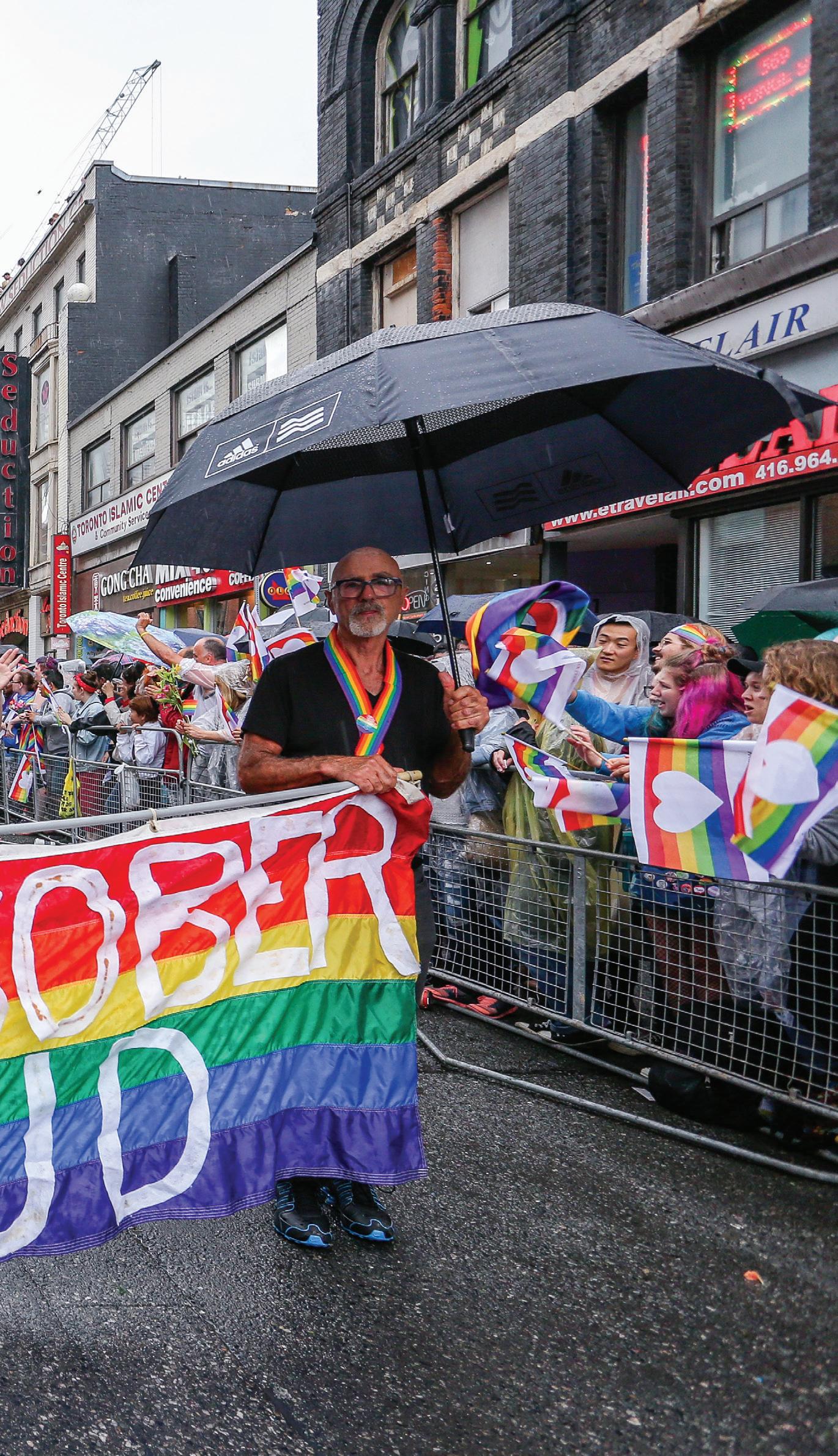
This phenomenon is known as minority stress theory, in which members of marginalized groups experience extra stressors from discrimination and prejudice. This can have adverse effects on their health. To cope, many turn to substances.
“As they’re walking through life, they’re looking for any positive feelings to numb or override those negative feelings that they’re getting from these messages,” Hoaby explains. “A lot of times LGBTQ folks will turn to substances like opioids because they provide that euphoric feeling that they’re not used to getting in their day-to-day lives.”
LGBTQ+ people often don’t have a strong support system, Hoaby notes, as “their families and friends may have ostracized them after they came out.” In “looking for connection,” queer people sometimes turn to drugs and alcohol, which can be common in LGBTQ+ spaces like bars or parties.
One way to avoid activities centered around alcohol and drugs is to search online for sober queer events. Even just “having a small community of people going to a coffee shop and being able to hang out” can provide a “positive support system,” Hoaby says.
There are also resources that provide support for members of the LGBTQ+ community as they deal with substance abuse. The Pride Institute, founded in 1986, was the first drug rehabilitation center in the United States to specifically serve LGBTQ+ people. It offers nongendered services to adults 18 and older, including residential programming, partial hospitalization, and intensive outpatient programming. In Minnesota, where the Pride Institute is based, the state government has a behavioral health fund to help those with lower incomes pay for substance use disorder treatment.
“One huge way that government systems can influence someone’s life is to just recognize that a lot of times these folks don’t have a lot of resources,” Hoaby says. “They’re not able to fund treatment themselves, so any way governments can step in and assist with that is huge.”
Governments also have a responsibility to consider how they speak about substance use, as it’s important to reduce shame and stigma around addiction, she adds.
“It can really happen to anyone,” she says. “It’s not just the people that you see living out on the streets — it can be doctors, lawyers, and all these people that society sees as prominent being affected by addiction as well.”
For those who have not yet taken the first steps toward recovery, there are resources available that can protect their health. Hoaby encourages people to test their substances if they do intend to use; test strips for fentanyl — the dangerous synthetic opioid that is often found in other drugs — are available at most drug stores. And many community organizations offer services that promote harm reduction through testing and other programs like syringe exchanges, where you can get clean needles. Lifesaving naloxone nasal spray (sold under the brand name Narcan), which helps reverse the effects of an opioid overdose, is available in all 50 states. You can get naloxone at a pharmacy without a prescription.
“There’s just so many great programs out there that are helping people use more safely if that is their choice,” Hoaby says. “If that is something that you want to engage in, there are ways to do that, that reduce the harm that could potentially come to someone.”

The record-breaking HIV and AIDS fundraiser, AIDS/LifeCycle, will end after 2025’s event, but the lives saved and the memories created over 30 years endure.
BY ALEX COOPER
SINCE THE ’90S, AIDS/LifeCycle (initially the California AIDS Ride) has raised funds to support those living with HIV or AIDS through the San Francisco AIDS Foundation and the Los Angeles LGBT Center. But 2025 will be the event’s final 545-mile spin from San Francisco to Los Angeles over seven days.
The record-breaking fundraising event that draws about 2,500 cyclists and 600 roadies each year took a hit in the pandemic while fundraising slowed.
“AIDS/LifeCycle has existed as a beacon of strength and hope for people living with HIV and LGBTQ+ communities for more than 30 years,” Tyler TerMeer, CEO of the San Francisco AIDS Foundation, said in a statement. “We have built an incredible community and supported so much more than an annual bicycle ride — we have made an impact on the HIV epidemic.”
Though AIDS/LifeCycle is sunsetting in 2025, the organizations remain dedicated to ending HIV and AIDS. Organizers aim to exceed the record of $17.8 million for the final hurrah.
In the photos on these pages, Chris Eisenberg — a veteran AIDS Lifecycle cyclist since 2004 and a training ride leader since 2006 — has captured riders and roadies reveling on the road throughout the years.





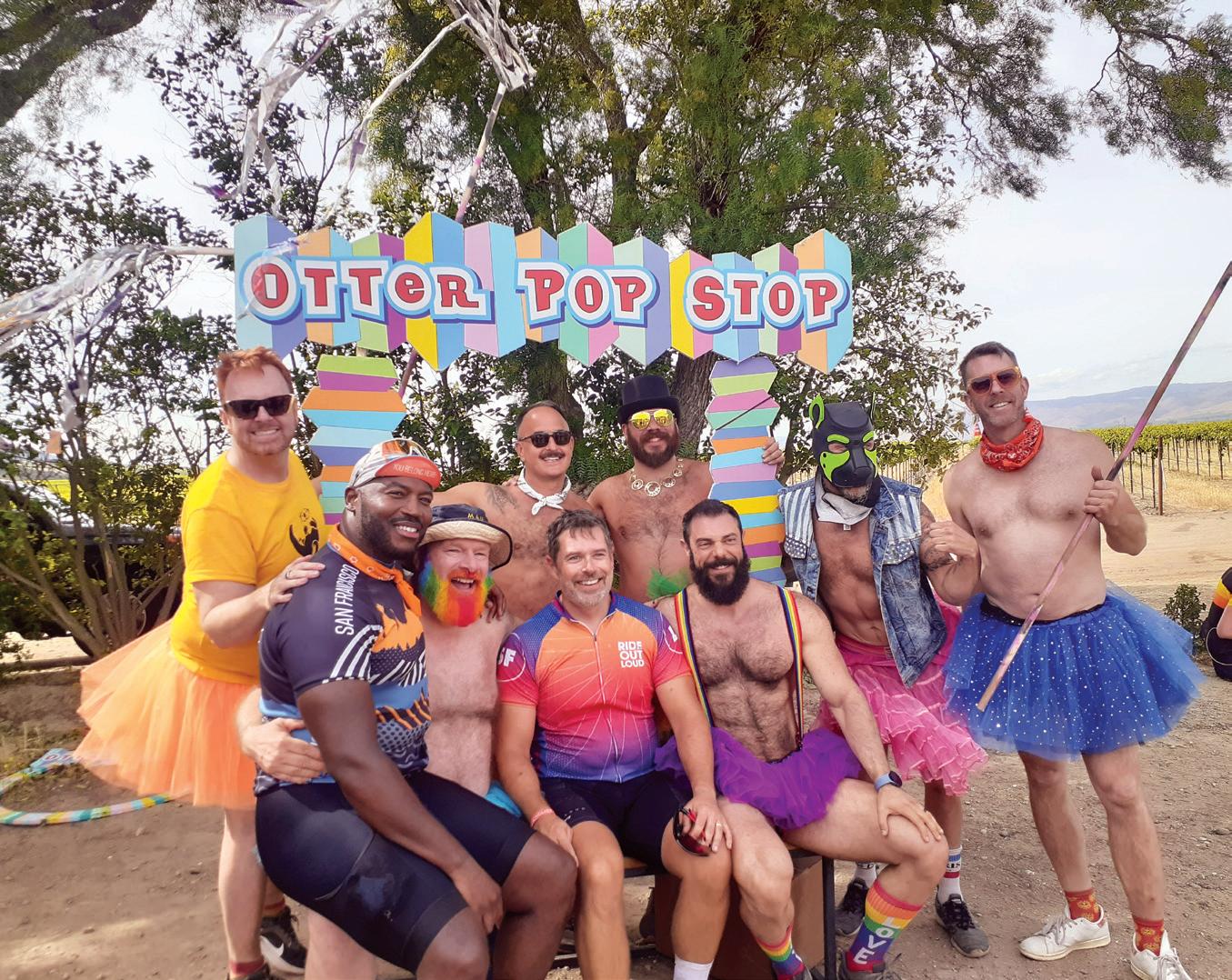


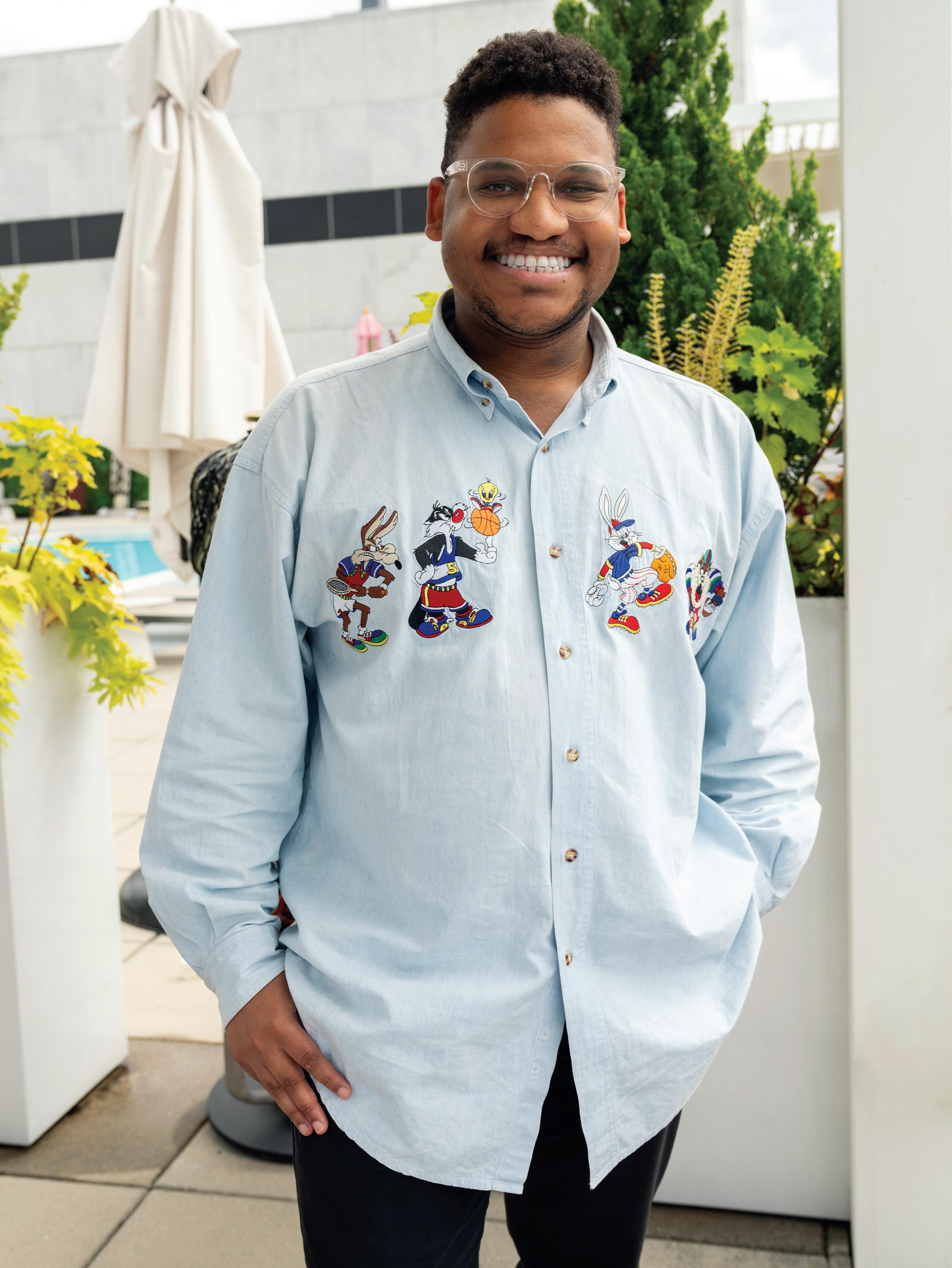
At 29, Armonté Butler — our Health Hero of the Year — is a leading advocate of health education, particularly for marginalized communities.
BY DESIRÉE GUERRERO
Abeloved teen comedy led Armonté Butler to become an advocate for sexual health, particularly for those who don’t often receive that critical information. Unlike that of certain mean girls, his message is that you can sit with us —and empower yourself with health education.
Based in the Washington, D.C., area, Butler is an accomplished health expert and champion for marginalized people, including youth, BIPOC people, and the LGBTQ+ community. He earned a master’s in public health from the Johns Hopkins Bloomberg School of Public Health, focusing on adolescent health risks, health equity, and policy. Among many other roles, Butler is the associate director of LGBTQ health and rights at Advocates for Youth (advocatesforyouth.org), an organization dedicated to promoting effective reproductive and sexual health programs and policies for young people in the U.S. and the Global South.
As head of the Queer and Gender Equity Project, Butler helps provide communitybased health care organizations with education, research, training, and technical assistance to increase support for queer youth of color and young people living with HIV. He manages the All Students Count Coalition and the National Youth HIV and AIDS Awareness Day project. He also leads YouthResource,
a leadership program designed by and for LGBTQ+ youth of color.
We recently had a chance to chat with the inspiring 29-year-old health advocate about his life, his work, and what inspires him to keep going.
How did you come to be a professional advocate for LGBTQ+ youth, particularly around sexual and reproductive health?
Mean Girls premiered in 2004 and remains a landmark in pop culture. The gym teacher’s exaggerated “Don’t have sex, because you will get pregnant and die!” mirrored too close to the sexual health education I received growing up. It was on a Thursday afternoon of high school sophomore year in a muggy gym auditorium where close to 60 peers and I received sex education information that spread shame and stigma, particularly concerning human immunodeficiency virus. After this lecture, I decided I no longer wanted a dishonest and stigmatized portion attached to sex education, and my passion for sexual health awareness grew.
I decided to take action while still in high school by joining the youth advisory board of a D.C.-based public health organization. The YAB trained teenagers to become peer health
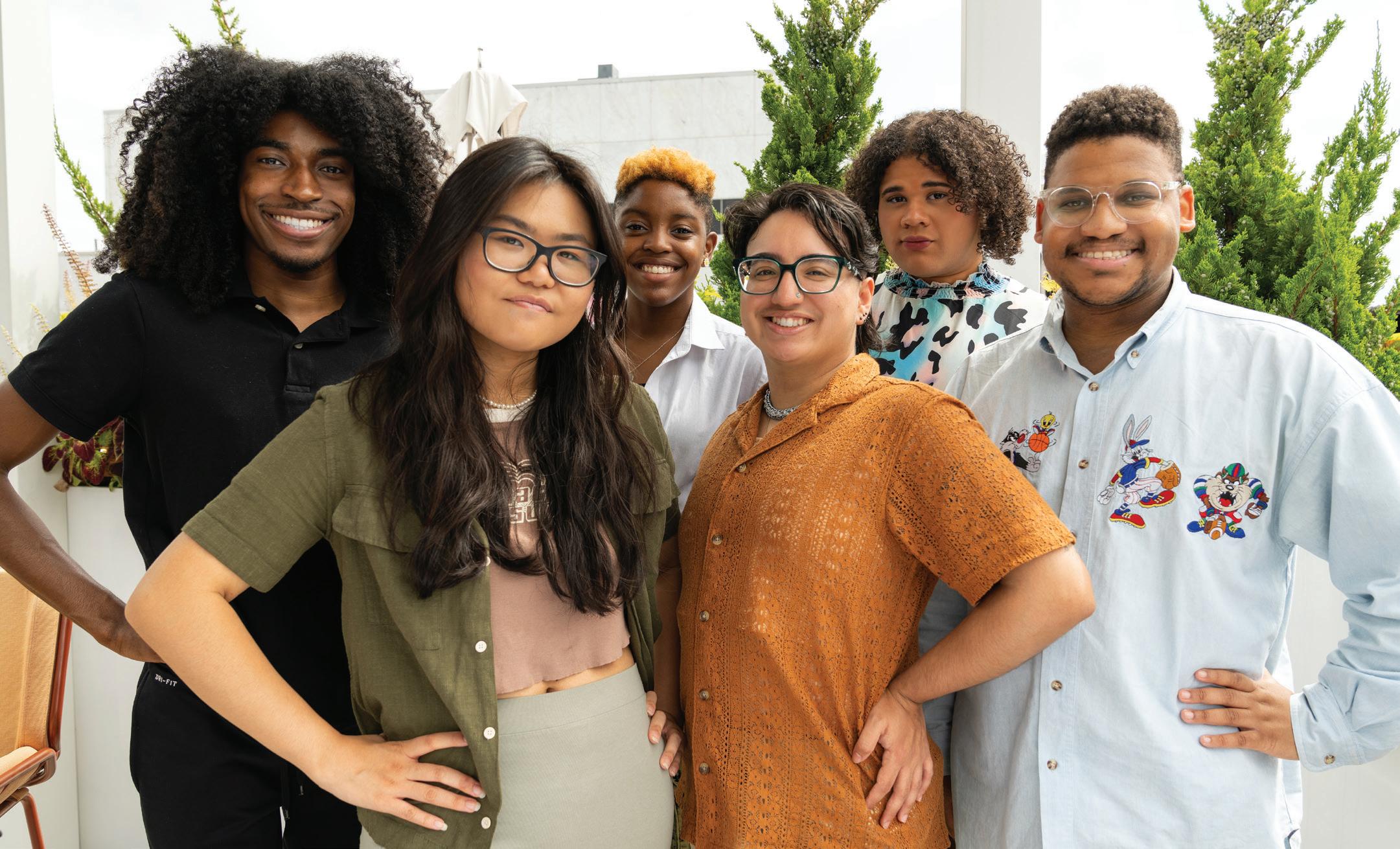

educators dedicated to ensuring young people’s access to medically accurate and comprehensive sexual health information. The YAB’s activities included providing feedback on youth-centered condom marketing campaigns and increasing sexually transmitted disease testing amongst young people in D.C. By participating in the YAB, I developed health education and promotion skills, cultural competency, and communication skills. I led after-school sessions at youth-serving community-based organizations on LGBTQinclusive sex education for young people from various backgrounds.
Since then, I’ve worked on issues related to adolescent and LGBTQ+ youth sexual and reproductive health at various federal, national, and international organizations.
You’ve achieved so much personally and professionally at a relatively young age and have done a lot of amazing work for the LGBTQ+ community and other marginalized folks. Where do you think this drive comes from?
On a Thursday afternoon of high school sophomore year in a muggy gym auditorium ...I received sex education information that spread shame and stigma. After this lecture, I decided I no longer wanted a dishonest and stigmatized portion attached to sex education.
Since I was younger, this drive has come from my belief that there is a better world worth fighting for. This drive also comes from growing up in a predominantly Black and Latinx neighborhood and realizing that we weren’t getting a fair shot at opportunity. The neighborhood I grew up
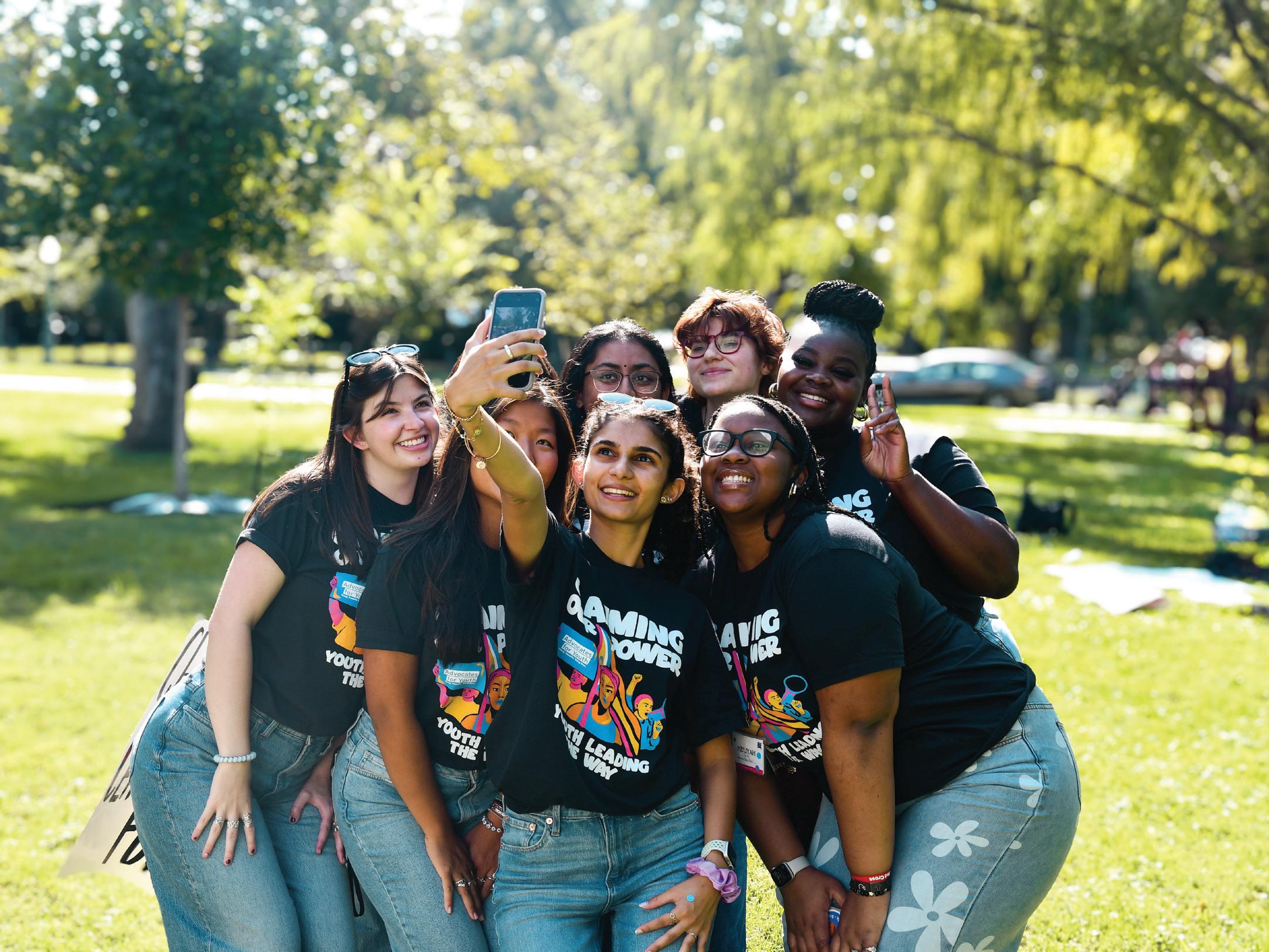
in, in D.C., wasn’t near any grocery stores, safe parks, or playgrounds. When we’re thinking about creating safer spaces for LGBTQ+ youth and other marginalized children, we must also consider how our sexual and reproductive health intersects with how places and spaces are designed and invested in.
Advocacy can be exhausting work and can lead to what many call “activist burnout.” How do you avoid that and stay motivated?
To avoid “activist burnout” and stay motivated, I go on vacations abroad and staycations in the U.S. as often as I can. I love traveling and exploring new museums, art spaces, restaurants, and beaches. I also enjoy reading books, visiting friends, and, most recently, cooking at home.
Tell us about any life-changing experiences you’ve had in your work. In 2015, I studied human rights and social movements in Buenos Aires, Argentina. The program, initiated by the School for International Training, was entirely in Spanish and included opportunities that highlighted
community-based organizations fighting for human rights and social welfare.
My experience in Argentina and courses related to global health and politics led me to apply for a university-funded fellowship for students interested in conducting an independent social science research project outside of the United States. While identifying potential topics and countries, I came across a few news articles that discussed stigma, discrimination, health care utilization, and HIV. One article, entitled “Dominican HIV/AIDS Groups Work to End Stigma,” stuck with me. Intrigued, I reached out to two of the organizations highlighted by the article, confirmed that I could work in partnership with them to support their organizational efforts and do interviews, and submitted a proposal to the fellowship committee. This opportunity informed me of the various issues related to LGBTQ and HIV-related stigma. To support my cultural immersion and sustainable engagement, I interned at a community-based organization that provides out-of-school and inadequately resourced LGBTQ+ youth with job and business training and experience. My roles included teaching English, translating documents, and supporting key staff in applying for USA-based grants.

BY JOHN CASEY
ALMOST 30 YEARS ago, the Northeast AIDS Ride, now known as Cycle for the Cause, began as a bike trek from Boston to New York City in response to the AIDS epidemic. Since 1995, the ride has continued annually, raising funds and awareness to combat HIV and AIDS. The event brings together LGBTQ+ people, allies, and those affected by the disease, creating a powerful sense of community and activism. A dedicated participant is Evan Bachner, who’s participated in the ride 18 times over the last 29 years.
A lifelong New Yorker and technology risk executive, Bachner, 67, is also a passionate advocate for LGBTQ+ rights. He’s co-captained corporate and community teams in some of those cycling events, and he helped establish LGBTQ+ employee resource groups within the major companies where he’s worked. Bachner emphasizes how the ride, organized by the NYC LGBT Community Center, has impacted people’s lives, raising funds for vital HIV services and education.
One of the ride’s most powerful moments is Red Dress Day, where participants, including the Positive Pedalers — HIV-positive riders — dress in red to form “a miles-long HIV awareness ribbon,” says Bachner, who trains each year for the event, driven by the cause and the community Cycle for the Cause represents.
“For me, that’s the high point of the ride,” he adds.


PATRICK KENNEDY KNOWS all too well what it means to deal with mental illness. The former Rhode Island congressman and son of the late U.S. Sen. Ted Kennedy has battled substance addiction and has been treated for depression. For over 30 years, he’s been open and honest about his struggles, being one of the first public figures to speak up about the subject. His new book, Profiles in Mental Health Courage, continues his advocacy.
Since deciding not to run for reelection in 2010, Kennedy has devoted his efforts full-time to helping advance the cause of mental health. In his book, he interviews therapists, family members, and friends to provide a more nuanced understanding of mental illness.
“It’s through these diverse perspectives that we can paint a more realistic picture of their experiences, one that transcends the tidy narratives we often prefer to hear,” Kennedy says. “And why is that important? Because so many people that I’ve heard from over the years who know someone with mental illness ask, ‘What can I do to help?’ And this book provides examples of not only fighting the illness, but also aiding in that help.”
Kennedy says the LGBTQ+ community provides a model for how to marshal resources to help a community that’s struggling. “I think what the queer community did, the way it went after funding for HIV/AIDS during the dark days of the epidemic, is a model for how to mobilize our own efforts,” he says. “The community is such a great example about how to win on vitally important issues, like they did for abolishing [don’t ask, don’t tell] and marriage equality. These examples are models for us to use and a source of inspiration.”
DR. CHRISTINE YU Moutier, chief medical officer for the American Foundation for Suicide Prevention, has dedicated her career to understanding and preventing suicide, especially among vulnerable populations. With decades of clinical and academic experience, Moutier has emerged as a leading figure in mental health advocacy, helping bridge the gap between research, policy, and compassionate care.
Moutier’s work at AFSP focuses on ensuring that comprehensive resources and support are available to everyone, particularly marginalized groups. This includes the LGBTQ+ community, who are disproportionately affected by mental health issues. LGBTQ+ individuals, especially youth, are at higher risk for suicidal ideation and attempts due to the impact of discrimination, stigma, and social rejection, Moutier says.
“These stressors can lead to feelings of isolation and hopelessness,” she explains. “That’s why it’s essential to create safe, affirming environments for LGBTQ+ individuals, both socially and in health care settings.”
One of the most effective ways to reduce suicide risk in the LGBTQ+ community is by fostering a culture of acceptance and inclusivity.
“When LGBTQ+ individuals feel supported and valued, their mental health outcomes improve dramatically. Simple acts of compassion, affirmation, and advocacy can make a huge difference,” she notes. She also highlights the importance of equipping health care professionals with the training to offer culturally competent care, ensuring that LGBTQ+ people feel seen and heard in mental health treatment.
Through her leadership at AFSP, Moutier continues to advocate for research, education, and policy changes to support those at risk of suicide. Her dedication to reducing stigma, increasing awareness, and promoting inclusivity has made her a critical voice in the fight for mental health equity.
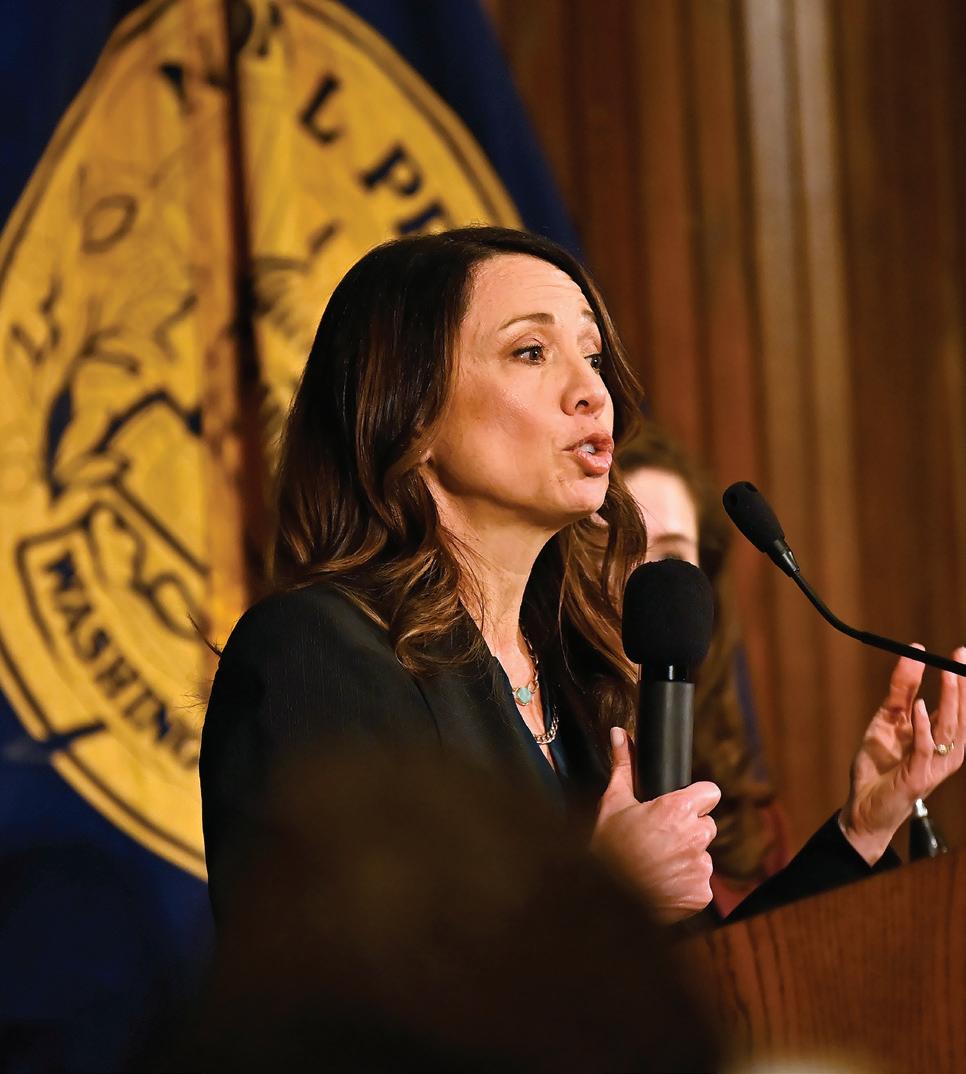

THIS YEAR KAMDEN Romano became the first transgender and deaf triathlete to compete in the famous Escape From Alcatraz triathlon, placing third in the open division. “Escaping” the triathlon felt like the perfect metaphor for Romano’s life. “I escaped the wrong body and am finally enjoying the freedom of being who I am,” they say. “It’s like escaping from society and having the freedom to love whoever and be whoever you want to be.”
The Illinois-based athlete was born deaf to a hearing family and has two siblings, one of whom is also deaf. When you are deaf, the hearing world can present some major challenges, but Romano says, “Despite being deaf, I don’t have any physical limitations. I can still accomplish whatever someone who can hear can do, except for the hearing part.”
Romano grew up playing soccer and competed in two Deaflympics in 2005 and 2009. While attending Gallaudet University in Washington, D.C., Romano played for a women’s tackle football team. After he graduated, Romano started running and has been running triathlons for the last five years. “I’ve run 10 marathons, over 30 half-marathons, and recently completed my first 50k in February on my birthday,” Romano says. “In 2019, I moved on to triathlons. I love finding new challenges and pushing my body to its limits.”
Romano has advice for other deaf queer people. “Take care of your body,” he says. “You live in there. Treat it like it’s your home. Do what makes your soul happy. And don’t let your deafness or gender identity stop you from doing what you love. Life is too short.”
BY ALEX COOPER
REBECCA HART HOLDER realized the precarity of Roe v. Wade back in the early 2010s. It’s what led her to become interested in state-level reproductive rights advocacy, she says. “The election of Donald Trump in 2016 solidified this belief, and when I had the opportunity to lead a state-based advocacy organization focused on expanding access to reproductive health care and, especially, access to abortion care, I jumped at the chance,” Hart Holder says.
Hart Holder has been president of the reproductive rights group Reproductive Equity Now since 2017. She’s hopeful for the future of abortion access, given the success of activists at the state level. “From Ohio to Kansas, from Vermont to Kentucky, when abortion is on the ballot, we win,” she says. And in the November election, reproductive rights will be on the ballot in at least 10 states. Hart Holder and her organization are looking to shore up abortion access in states like Massachusetts and Connecticut while also providing access to those living in abortion-restrictive states.
As for what others can do to help sustain reproductive rights, Hart Holder says “invest in your state.” She explained that state-based advocates are organizing to support laws protecting providers who mail abortion medication to people across the country — even in states that have abortion bans. It also means working with lawmakers to develop state constitutional amendments to restore the legal right to abortion.
What keeps Hart Holder inspired as a health advocate? It’s simple, she says: It’s the mission. “All people deserve the fundamental right to control their bodies and their future,” she says. “Through the work of the extraordinarily talented team at Reproductive Equity Now, we have a unique opportunity and ability to fight back against attacks on our fundamental freedoms.”
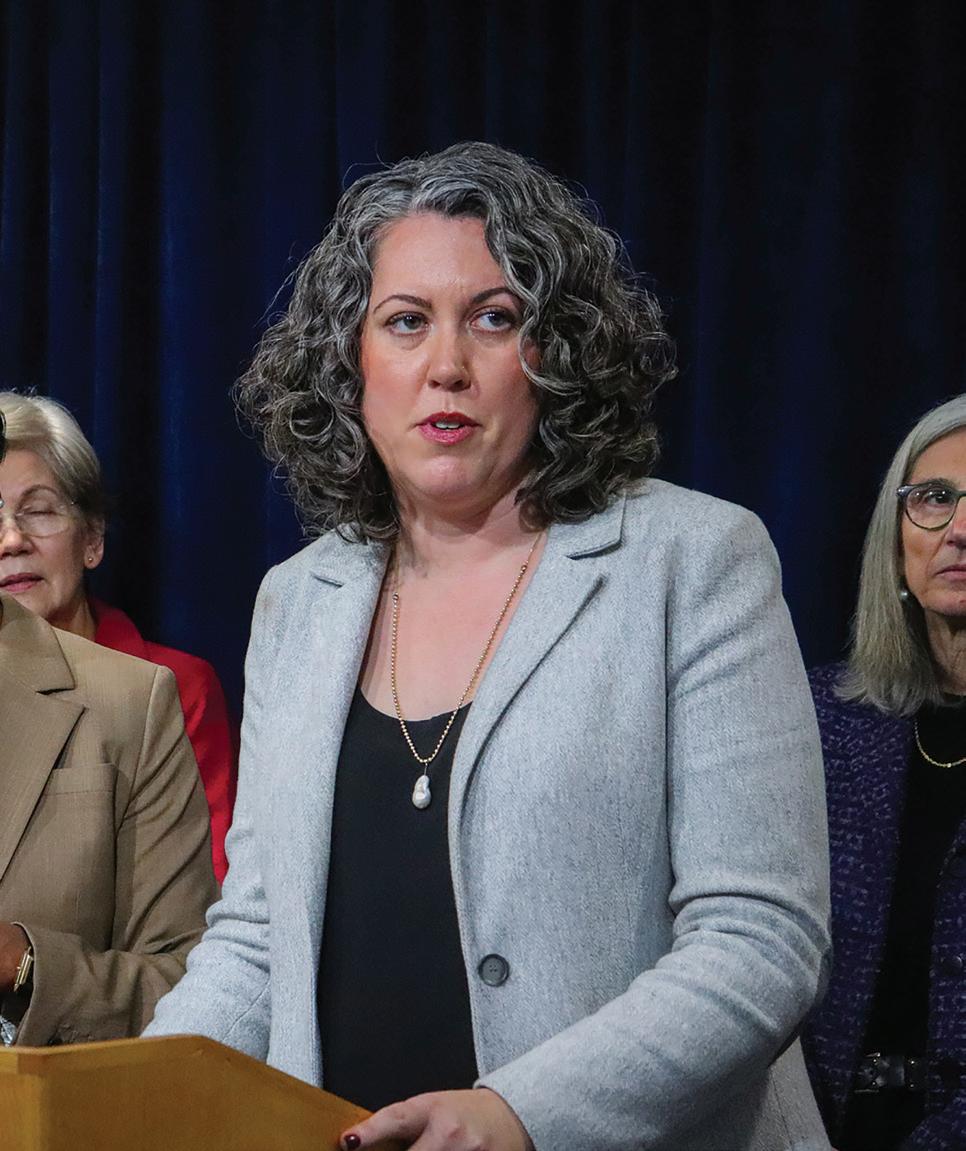
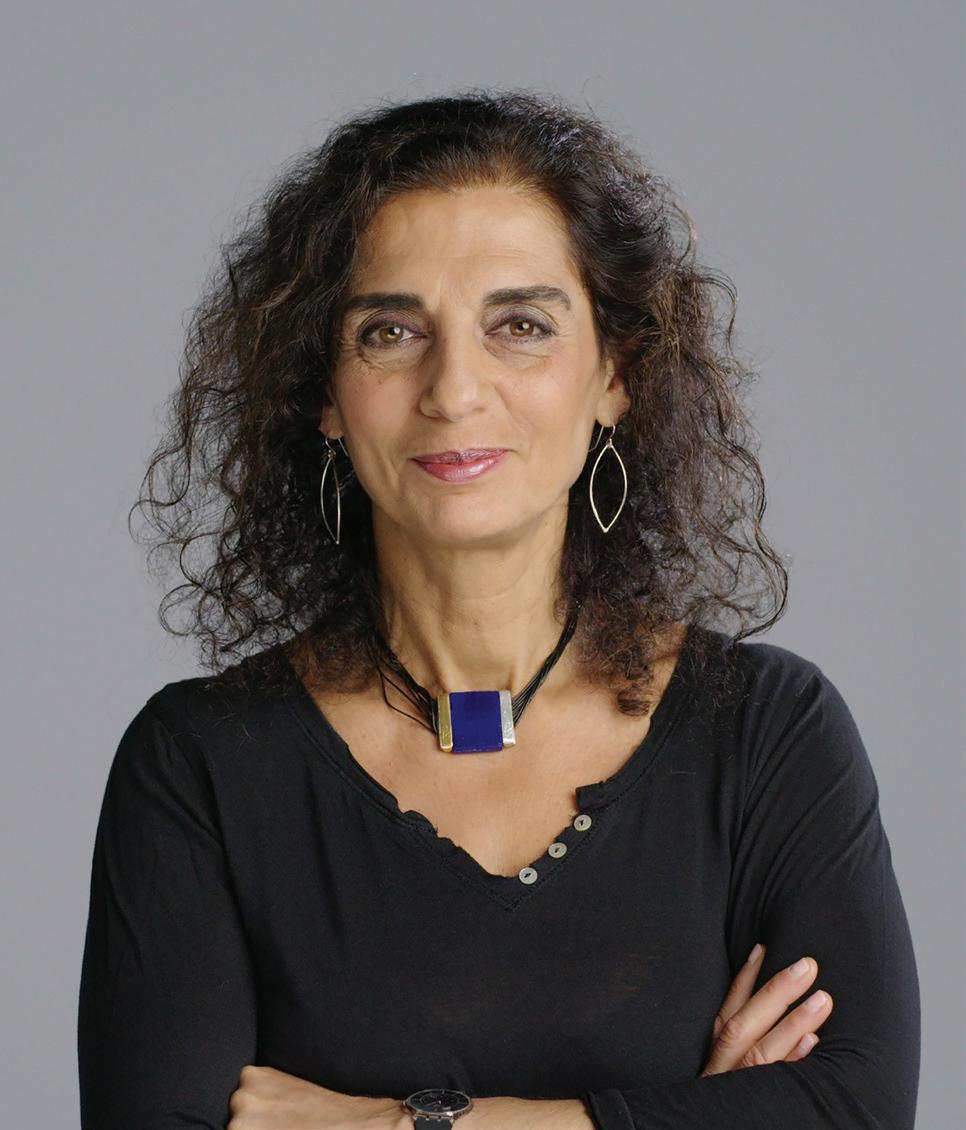
THIS YEAR THE L’Oréal-UNESCO award committee named Dr. Nada Jabado its 2024 L’Oréal-UNESCO for Women in Science Laureate for North America. The awards are given to exceptional women scientists across five regions around the world: Africa and the Arab States, Asia and the Pacific, Europe, Latin America and the Caribbean, and North America.
A professor at McGill University and Canada Research Chair in Pediatric Oncology, Jabado always wanted to practice medicine. During her studies, she came to understand that along with effective treatment, research is also needed to fully support the patient.
“In the words of Einstein, our knowledge is limited, but our imagination, intuition, and curiosity are boundless,” Jabado says. “For me, research is like music, soothing me when I fail and offering hope where it’s needed.”
The researcher earned this latest award for “revolutionizing our comprehension of the genetic defects responsible for aggressive pediatric brain tumors,” according to the award announcement. “Through her innovative research and effective leadership in establishing a global collaborative network, she has reshaped the medical approach to pediatric cancer, advancing both diagnostic capabilities and clinical treatments for young patients,” it continues.
Jabado says programs like the L’Oréal-UNESCO for Women in Science International Awards are important because of their global recognition. “Highlighting women that succeed offers real visible examples to many young women and can inspire them to follow a similar path, as succeeding as a woman is doable,” Jabado says.
Her message to other female scientists? They should believe in themselves and their ability to have careers and personal lives. “You owe it to yourself to try,” she says. “Remember that we [who] succeed are not exceptions; we are the emerging rule.”

A new twice-yearly injectable to prevent HIV is even more effective than daily pills.
BY DONALD PADGETT
Lenacapavir, when injected twice a year to prevent HIV, demonstrated superiority to the once-daily Truvada pill in a recent clinical trial, pharmaceutical giant Gilead announced in September. It was the second of two Phase 3 trials that ended early due to successful results.
Gilead and the study’s researchers see lenacapavir as a potential milestone in the battle against HIV. It is currently marketed for HIV treatment under the brand name Sunlenca.
“With such remarkable outcomes across two Phase 3 studies, lenacapavir has demonstrated the potential to transform the prevention of HIV and help to end the epidemic,” Gilead Chairman and CEO Daniel O’Day said in a press release.
Purpose 1, the first Phase 3 trial, took place in June and measured the effectiveness of lenacapavir in cisgender women in sub-Saharan Africa.
Purpose 2, the second Phase 3 trial, included cisgender and transgender men, transgender women, and nonbinary people in Argentina, Brazil, Mexico, Peru, South Africa, Thailand, and the United States. All the participants engage in sexual relations with partners assigned male at birth. In this study, 2,180 participants used lenacapavir and 1,087 used Truvada. There were only two reported incidents of HIV in the lenacapavir test group versus nine in the Truvada group.
“In the United States, the stubbornly high rate of HIV diagnoses — especially in the U.S. South, and particularly among gay and bisexual men of color and transgender people — demands novel approaches to help people prevent HIV acquisition,” Dr. Colleen Kelley, professor of medicine at Emory University and a
principal investigator in the trial, said in the release. “Because adherence to oral products can be challenging for some people, twice-yearly injectable lenacapavir for PrEP has the potential to be one of the most impactful interventions we could have to drive down new infections and bring us closer to ending the HIV epidemic in the United States.”
Lenacapavir’s price for use as HIV treatment is $3,450 per month, according to NBC News. Gilead hasn’t set a different price for use as PrEP; a company spokesperson told NBC the current price won’t necessarily be the price for the drug’s use as a preventative, but it’s unclear if that means a lower price. The company plans to seek Food and Drug Administration approval for preventative use of lenacapavir by the end of the year.
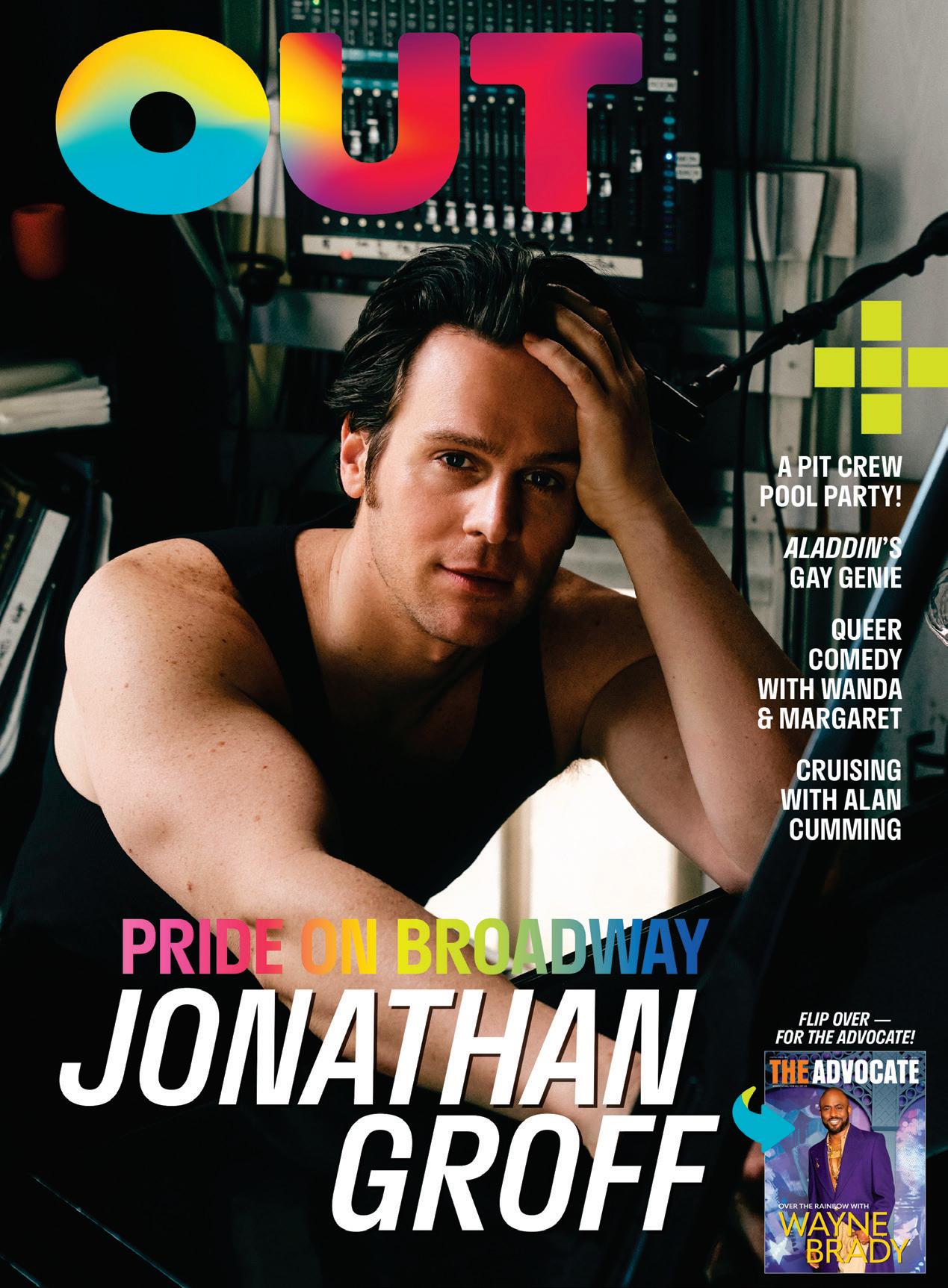

Queer Hikes brings LGBTQ+ people together to explore nature and create community.
BY KAYLA GAGNET
WHILE making new friends – that’s the mission of Queer Hikes, a community of LGBTQ+ outdoors enthusiasts based in southern New England. The volunteer group organizes free events across Rhode Island and eastern Massachusetts – from gentle walks to more ambitious hikes (and even some with dogs!).
Queer Hikes co-organizer Elliot Henderson shares how the group got started and how it’s fostering a safe space outdoors.
What’s the history behind Queer Hikes?
Our group started in 2021 by our founder Mel, who wanted to create an intentional queer community outdoors. Word of our hikes spread online, and folks continued to show up and enjoy our hikes for the last three years! The Queer Hikes team consists of myself, Elliot (he/him), Roni (they/them), Ben (they/them), and Sylvia (she/her) as the leaders. We work on a volunteer basis to host two to four hikes a month and free, queer-friendly events with a variety of community partners.
What do you love about hiking?
We love hiking because it fosters a sense of belonging and appreciation for nature. We encourage all people to feel a sense of connection and obligation to the natural world.

What is the importance of having a dedicated queer group for hikers and outdoors enthusiasts?
We recognize the need for a welcoming queer-friendly space for folks to gather and explore the outdoors together. Having a dedicated queer group for hikers can allow folks who have been historically isolated from an outdoor community a space to explore themselves through connection with nature.
Tell me about the community you’ve created in southern New England. Are there any fun stories of friendship or connection?
We have been so lucky to get to work with so many fantastic partners in our community. Our partnership with OutHounds [Adventure and Training Academy] has allowed our participants to bring their four-legged friends to join our hikes. Through our partnership with
[the] Massachusetts and Rhode Island Audubon [Societies], we have been fortunate to put on many popular events, including our Owl Prowl, Stargazing Walks, and Vernal Pool Exploration.
What would you say to an LGBTQ+ person looking to be more active outdoors?
Come on out and join us! We always post our hikes online, and they are always free. We hope to see you there!

Add some zest to life while keeping it light and healthy.
IF YOU’RE LOOKING for a dinner or lunch combination that is wholesome, filling, and, of course, easy, you’re not alone. Meal prepping is a popular trend for many people (and families) who are working on healthy eating habits but are constantly on the go.
No matter if you’re searching for a healthy family dinner, a quick lunch at home, or an easy idea to meal prep for the week ahead, this Orange Shrimp Quinoa Bowl is perfect for seafood lovers who also enjoy a hint of spice. It’s fresh, healthy, and full of deliciously prepared shrimp and veggies, including mushrooms, peppers, and cucumbers.
The sauce is light and has a sweet yet spicy vibe. Everything rests over one cup of steamy quinoa — a filling base that also serves as an easy way to add some healthy grains to your diet.
Serves 2
INGREDIENTS
1 cup quinoa
1 cup orange juice
1 tablespoon hot sauce
1 tablespoon honey
1 tablespoon soy sauce
4 tablespoons vegetable oil
1 tablespoon lime juice
1 tablespoon white miso
¼ cup butter
1 ½ pounds shrimp, peeled, deveined, and tails removed
¼ teaspoon salt
1/8 teaspoon pepper
1 cup mushrooms, sliced
1 red bell pepper, diced
1 cucumber, sliced into half moons
5 green onions, sliced
1 avocado, sliced
1 teaspoon sesame seeds
2 tablespoons cilantro, chopped
Cook quinoa according to package instructions. Set aside.
In medium bowl, whisk orange juice, hot sauce, honey, soy sauce, vegetable oil, lime juice, and miso until combined. Pour one-quarter of liquid into separate bowl. Set aside.
Add shrimp to remaining mixture and marinate 15 minutes.
Heat butter in large skillet on medium setting. Add shrimp, salt, and pepper. Cook shrimp two minutes on each side until they are pink. Add mushrooms and cook until tender.
In two serving bowls, divide quinoa, bell pepper, cucumber, onions, avocado, and shrimp. Sprinkle sesame seeds and cilantro over both bowls.
Drizzle with reserved dressing.
International music sensation and actor Christian Chávez opens up about his journey to self-acceptance and the importance of prioritizing mental health.
songwriter, and actor Christian Chávez launched his career on the telenovela Rebelde and in the wildly successful Latinx pop group RBD. He’s currently featured in the Disney+ series Elreydelosmachos.

RBD’s 2023 reunion tour was an international phenomenon and an opportunity for Chávez to raise his voice artistically and personally. He’s used his platform to advance LGBTQ+ representation as well as bring awareness to some of the health issues that directly affect this community, such as HIV and mental health.
Earlier this year, Chávez was the featured guest of MPact Global for events during the International AIDS Conference in Munich, Germany. We had the opportunity to sit down with Chávez during the conference to learn more about his incredible journey as one of the few out gay performers in Mexico who has proudly celebrated his identity, entertained millions, and used his platform to advance marginalized communities and mental health awareness.
You’ve endured homophobic discrimination and experienced the media treating you badly and still emerged triumphantly in your most recent tour. How were you able to arrive at that position of strength?
Well, in retrospect, it looks like I won, right? Like, Wow, he made it. And it’s so amazing. But at the moment, it was very [messed] up, honestly. And I went through moments when I honestly thought that I wasn’t going to be able to survive certain parts of the process. But now it’s like I can look back, and I can look at all those things that happened to me. They happened for a reason, and they took me to this place of acceptance and self-love that’s worth it. Totally worth it. So, it is a process
Self-acceptance is so often about also accepting the most difficult and challenging parts of ourselves. Do you feel like you’ve been able to do that with some of the things you’ve had to go through?
It’s learning. Of course, therapy has taken me to the place of acceptance — and acceptance is like, OK,rightnowIfeellikethis…Ifeelalone So, you have to accept that part of yourself, of your life, what you’re going through. And when you accept that you listen to yourself and to your body and to your soul, and it’s way easier to be present in the here and now. And that’s very powerful. It takes a long time to get to there.
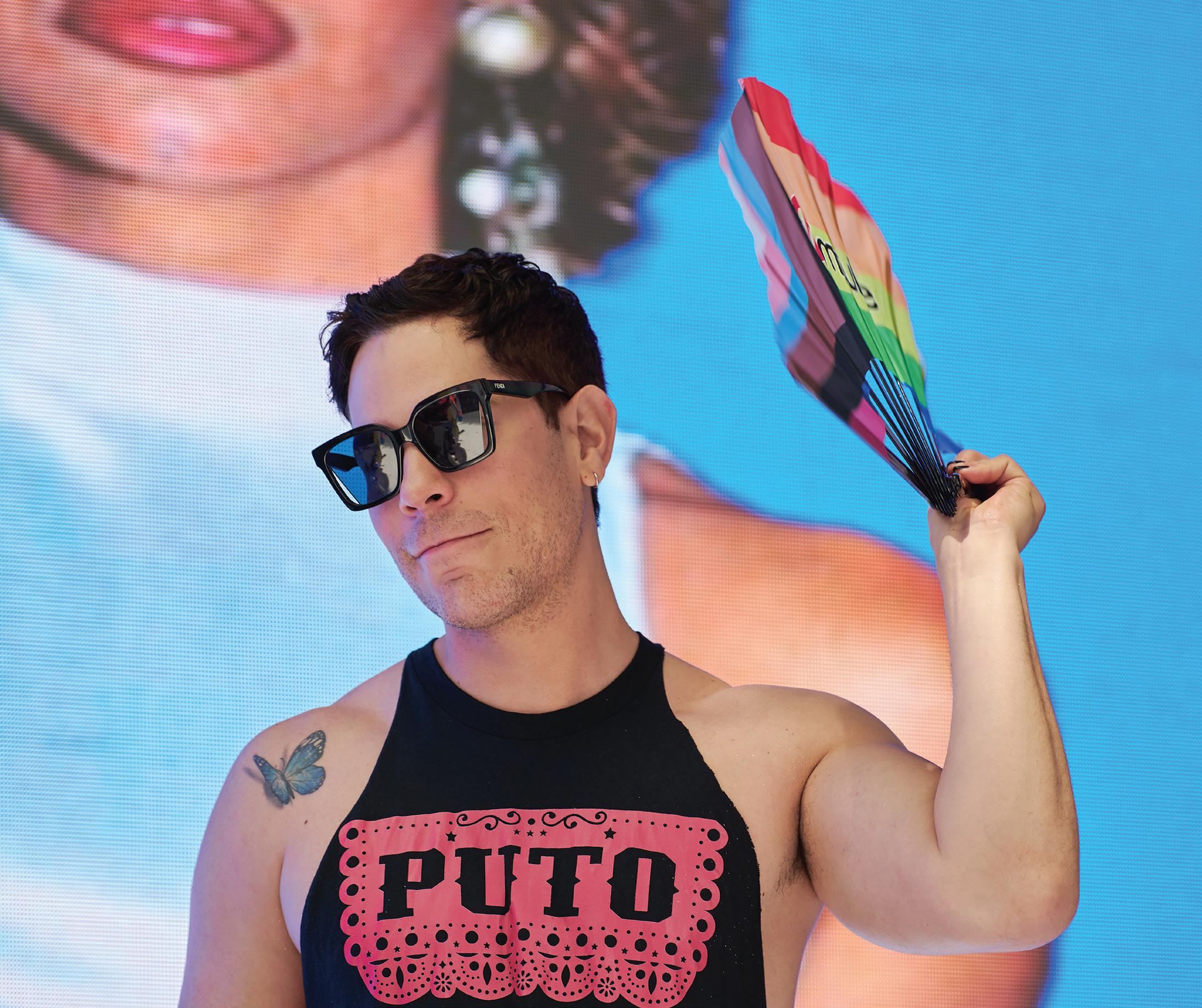
At a performance during RBD’s reunion tour last year, you famously said, “If fighting for my freedom makes me a puto, then I am a puto!” What did it mean to you to be able to reclaim this word in such a public and powerful way?
Well, “puto” is Spanish for “fag.” It’s a way to refer to someone, especially a man, as feminine. It was like the pinnacle of my work on myself. It was like that aha moment that I was waiting for. To realize that a word that hurt me for so long and that took away my strength, my power, that it’s just a word. That’s kind of shocking. I mean, it’s so obvious, and it’s so in your face, but at the same time, it is like when we take those words that hurt us so much and we use them as a shield. Now it’s different because it’s just a word I would say.
Mental health is so important to our community and quality of life. How can we work to destigmatize mental health issues?
Well, I guess we have to talk about it a lot. We have to put our stories out there. Representation is very important. People need to feel like it’s OK to not be OK. For example, it’s a key point that I’m talking about everywhere that I go. I always talk about mental health.

There are things you should consider to help protect you and your baby during pregnancy. HIV treatments may allow you to reach and stay undetectable if taken as prescribed. Undetectable means that there is so little virus in the blood that a lab test can’t measure it. Taking HIV treatment as prescribed, along with other guidance from your healthcare provider, may help lower the chances of transmitting HIV to your baby during pregnancy and childbirth. Talk to your healthcare provider about HIV treatment and additional considerations both now and for the future for family planning, pregnancy, childbirth, and breastfeeding when living with HIV.
Have an open and honest conversation with your healthcare provider to start, switch, or continue on the HIV treatment that’s right for you.
Learn what’s possible about pregnancy and living with HIV.
Taking HIV treatment as prescribed, along with other guidance from your healthcare provider, may help lower the chances of transmitting HIV to your baby during pregnancy and childbirth. In 2019, less than 1% of new HIV diagnoses in the United States were due to transmission from mother to child.
The goal of treating HIV while pregnant is getting to and keeping your viral load at an undetectable level. Undetectable means that there is so little virus in the blood that a lab test can’t measure it. According to the CDC, if you take treatment as directed throughout pregnancy and delivery and give HIV treatment to your baby for the first 2 to 6 weeks after birth, the risk of transmission to your baby drops to below 1%.
Talk to your healthcare provider about HIV treatment, getting to and staying undetectable, and the recommendations for HIV treatment during pregnancy.